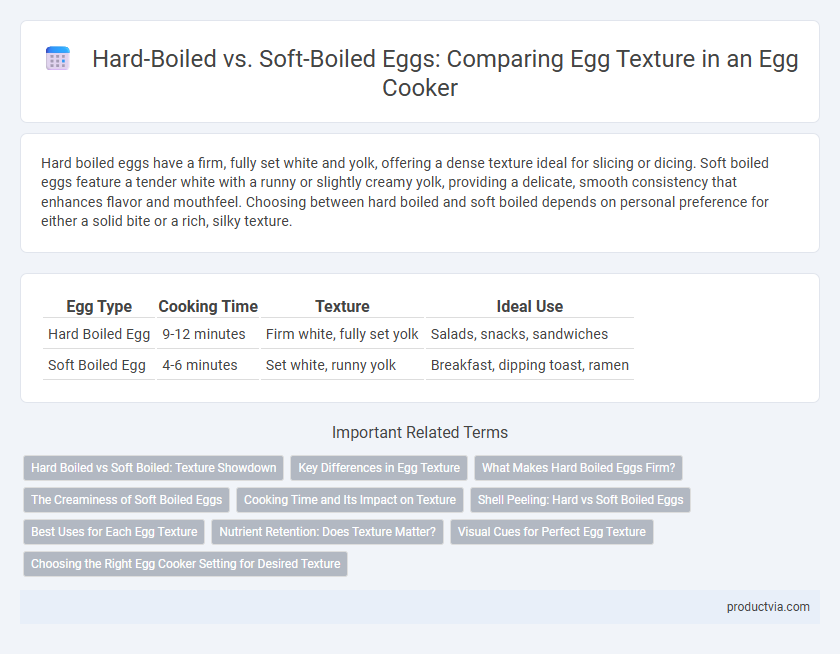Hard boiled eggs have a firm, fully set white and yolk, offering a dense texture ideal for slicing or dicing. Soft boiled eggs feature a tender white with a runny or slightly creamy yolk, providing a delicate, smooth consistency that enhances flavor and mouthfeel. Choosing between hard boiled and soft boiled depends on personal preference for either a solid bite or a rich, silky texture.
Table of Comparison
| Egg Type | Cooking Time | Texture | Ideal Use |
|---|---|---|---|
| Hard Boiled Egg | 9-12 minutes | Firm white, fully set yolk | Salads, snacks, sandwiches |
| Soft Boiled Egg | 4-6 minutes | Set white, runny yolk | Breakfast, dipping toast, ramen |
Hard Boiled vs Soft Boiled: Texture Showdown
Hard boiled eggs feature a firm, fully set yolk and a solid white, offering a dense and crumbly texture ideal for salads and sandwiches. Soft boiled eggs present a creamy, runny yolk with a slightly tender white, delivering a smooth and delicate mouthfeel prized for dipping and appetizers. This texture showdown highlights the distinct culinary uses and sensory experiences that hard boiled and soft boiled eggs uniquely provide.
Key Differences in Egg Texture
Hard boiled eggs have a fully cooked, firm white and a solid, crumbly yolk, providing a dense and dry texture. Soft boiled eggs feature a set white with a warm, runny yolk that offers a creamy and tender consistency. The key difference in texture lies in the yolk's firmness, which ranges from jammy and semi-liquid in soft boiled eggs to fully solidified in hard boiled eggs.
What Makes Hard Boiled Eggs Firm?
Hard boiled eggs achieve their firm texture through prolonged exposure to heat, which causes the egg white proteins to denature and coagulate tightly. The yolk solidifies as the heat breaks down its fat and protein structure, transforming it from a creamy consistency to a dense, crumbly texture. Precise cooking times and temperature control in an egg cooker ensure consistent firmness by evenly cooking the egg from the inside out.
The Creaminess of Soft Boiled Eggs
Soft boiled eggs achieve a creamy texture with a delicate, partially set yolk that contrasts with the firm whites, providing a rich mouthfeel. Hard boiled eggs have a fully cooked yolk that is crumbly and dry, lacking the smooth, custard-like consistency of soft boiled eggs. The creaminess in soft boiled eggs makes them ideal for dishes requiring a luscious, tender center, enhancing flavor and texture.
Cooking Time and Its Impact on Texture
Cooking time dramatically affects the texture of eggs, with hard-boiled eggs requiring 9-12 minutes to achieve a firm, fully set yolk and white, while soft-boiled eggs typically cook for 4-6 minutes, resulting in a tender white and runny yolk. The precise timing ensures the yolk's consistency varies from creamy to solid, catering to different taste preferences. Understanding these time intervals is crucial for optimizing egg cookers for perfect texture control.
Shell Peeling: Hard vs Soft Boiled Eggs
Hard boiled eggs have a fully set white and yolk, making the shell easier to peel due to the firm separation between the membrane and egg white. Soft boiled eggs maintain a runny yolk and slightly unset white, causing the shell to cling more tightly and complicate peeling. Optimal cooking times and cooling methods directly affect shell peeling efficiency for both hard boiled and soft boiled eggs.
Best Uses for Each Egg Texture
Hard boiled eggs have a firm, fully set white and yolk, making them ideal for salads, sandwiches, and egg-based snacks where shape retention is important. Soft boiled eggs feature a tender, slightly runny yolk and set white, perfect for dipping toast soldiers or adding a creamy texture to breakfast bowls. Choosing the right egg texture enhances recipe versatility and dining experience based on preferred softness and moisture content.
Nutrient Retention: Does Texture Matter?
Hard boiled eggs have a firm texture due to longer cooking times, which may cause slight nutrient loss, especially of heat-sensitive vitamins like B-complex and antioxidants. Soft boiled eggs retain a softer yolk and white, preserving more nutrients such as folate and vitamin B12 because of shorter exposure to heat. Choosing between hard and soft boiled eggs impacts nutrient retention, with soft boiled eggs generally offering higher vitamin preservation due to minimal cooking duration.
Visual Cues for Perfect Egg Texture
Hard boiled eggs feature firm, opaque whites with a fully set, pale yellow yolk, while soft boiled eggs display tender, slightly translucent whites and a runny, golden yolk. Visual cues such as the firmness of the egg white and the consistency of the yolk aid in distinguishing the desired egg texture during cooking. Achieving perfect egg texture requires observing these characteristics closely to stop cooking at the ideal moment.
Choosing the Right Egg Cooker Setting for Desired Texture
Selecting the correct setting on an egg cooker is essential for achieving the perfect egg texture, whether hard boiled or soft boiled. Hard boiled eggs require a longer cooking time, typically around 10-12 minutes, resulting in a firm white and fully set yolk ideal for salads or snacking. Soft boiled eggs, cooked for approximately 4-6 minutes, feature a tender white with a runny yolk, perfect for dipping toast or adding a creamy texture to dishes.
Hard boiled vs Soft boiled for egg texture Infographic

 productvia.com
productvia.com